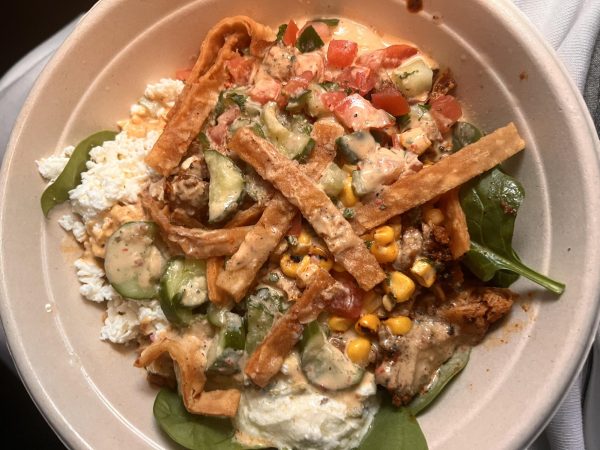Students get “vegucated”
“You’ve never had bacon?” or “You can’t eat cake?” are some of the questions that some vegetarians, vegans or both have to answer on a daily basis. Vegetarians and vegans are two different things but are sometimes confused as one. A vegetarian is one who chooses not to eat animal products like meat, fish or poultry. Vegans, on the other hand, eat neither animal products nor animal by-products like milk and eggs. Because vegans do not eat animal by-products, many people assume they will never taste the deliciousness of cake and other sweets. However, there are many recipes that produce the same taste without requiring milk and eggs.
Vegetarians and vegans have different reasons for avoiding meat and animal by- products. Some people have changed their diets because of an inspirational person.
“I had a camp counselor who was vegetarian and had a pet pig,” junior Mina Cho said. “On the last day of camp, she brought the pet pig in and it convinced me to be vegetarian.”
Other people have always been vegetarian because they were brought up that way and choose to maintain the same lifestyle.
“My parents never ate meat, so they never cooked meals with meat, so I just grew up like that,” junior Shreya Ramasubramanian said. “Many people assume I’m vegetarian for religious purposes but I’m really not.”
Others have watched an enlightening documentary, just don’t like the taste or remain vegetarian or vegan for health purposes. According to Brown University, vegetarians have a lower risk of developing certain diseases like heart disease, certain cancers, diabetes, high blood pressure and obesity. Likewise, according to Nursing Degree, vegans are less likely to develop cardiovascular disease, cholesterol and arthritis.
Although being a vegetarian or vegan offers multiple health benefits, it is harder for vegetarians and vegans to get certain nutrients offered by meat and animal products like iron, protein and calcium. Because it is harder to obtain these essential nutrients, according to Brown University and the website Health Eating, vegetarians are likely to be deficient in iron, vitamin B-12, vitamin D and zinc.
Many people decide to be vegetarian, but are unable to maintain that lifestyle because they are unable to get the essential nutrients or miss the taste of their favorite foods that contain meat.
“I was vegetarian for two months but I quit,” Cho said. “It was really hard to be vegetarian because I couldn’t eat a lot of foods that I liked because they had meat.”
Previously, a common problem with being vegetarian or vegan in the United States is that not a lot of places offer specific meals for vegetarians or vegans. Even if certain restaurants do, they don’t have a lot of variety.
“I always check the menu before I go to places because I want to make sure there are vegetarian options,” Ramasubramanian said. “I don’t want to get there to find out that the only thing I can have is a salad.”
However, in recent years, many restaurants and fast food chains have started including more options for their vegetarian and vegan customers. For example, Subway is a hot spot for vegetarians to go to because they allow you to pick and choose what you want on your sub. They offer a variety of vegetable options as well as veggie patties as a substitute for meat patties. Chipotle is also a common spot for vegetarians and vegans for similar reasons. Also, when a person orders a vegetarian burrito or bowl, their guacamole is free, while for other burritos or bowls, the guacamole is an extra $1.80.
Your donation will support the student journalists of Chantilly High School. Your contribution will allow us to cover our printing and annual website hosting costs.





